GRI 102-54
Impact of PSE on the Polish economy
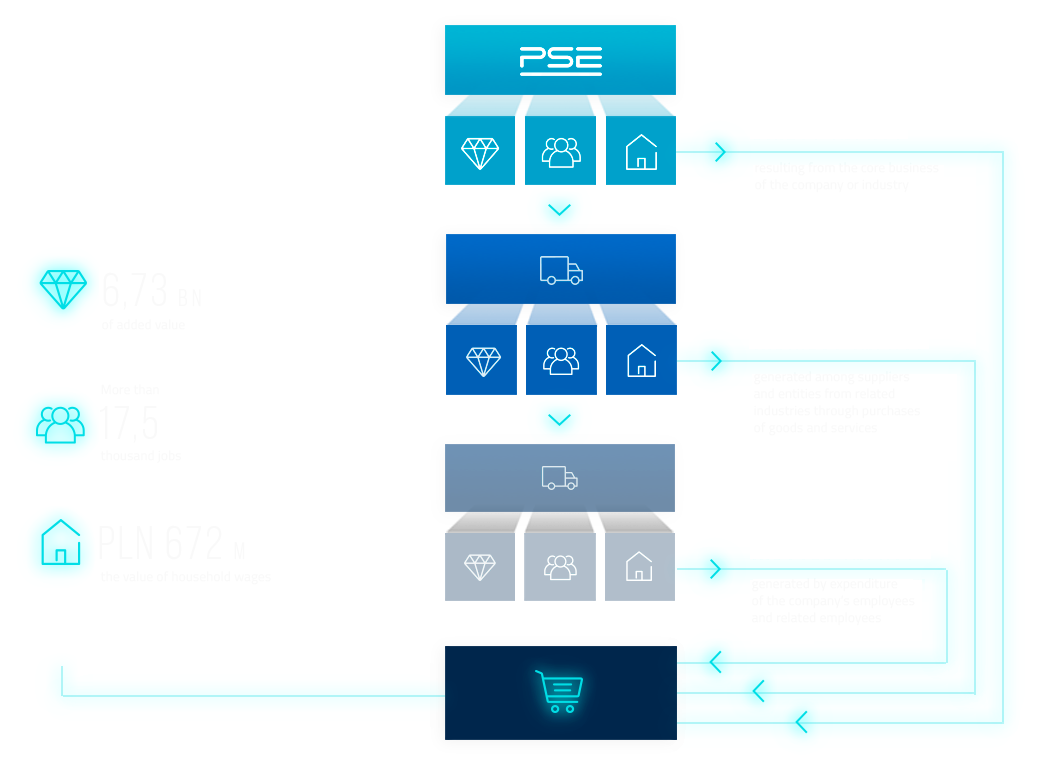

4,36 mld zł
added value

2 320
workplaces

206,5 mln zł
salary value

1,86 mld zł
added value

9 652
workplaces

370 mln zł
salary value

512 mln zł
added value

5 536
workplaces

95 mln zł
salary value
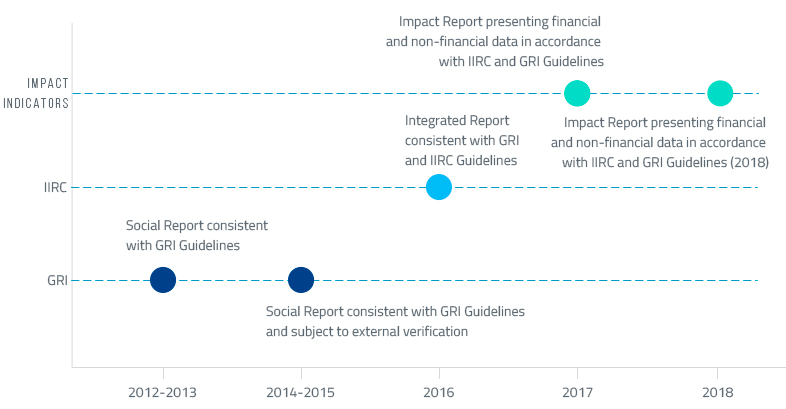
Selection of issues for the report
- an analysis of our company’s responsibility to the economy, society and the environment,
- review of challenges for the power sector,
- analysis of foreign energy companies’ reporting trends,
- standards adopted by PSE for integrated reporting,
- analysis of key impact indicators and PSE’s own indicators,
- review of documents defining business challenges in the context of sustainable development – Sustainable Development Goals,
- analysis of internal documents.
GRI 102-42
GRI 102-43
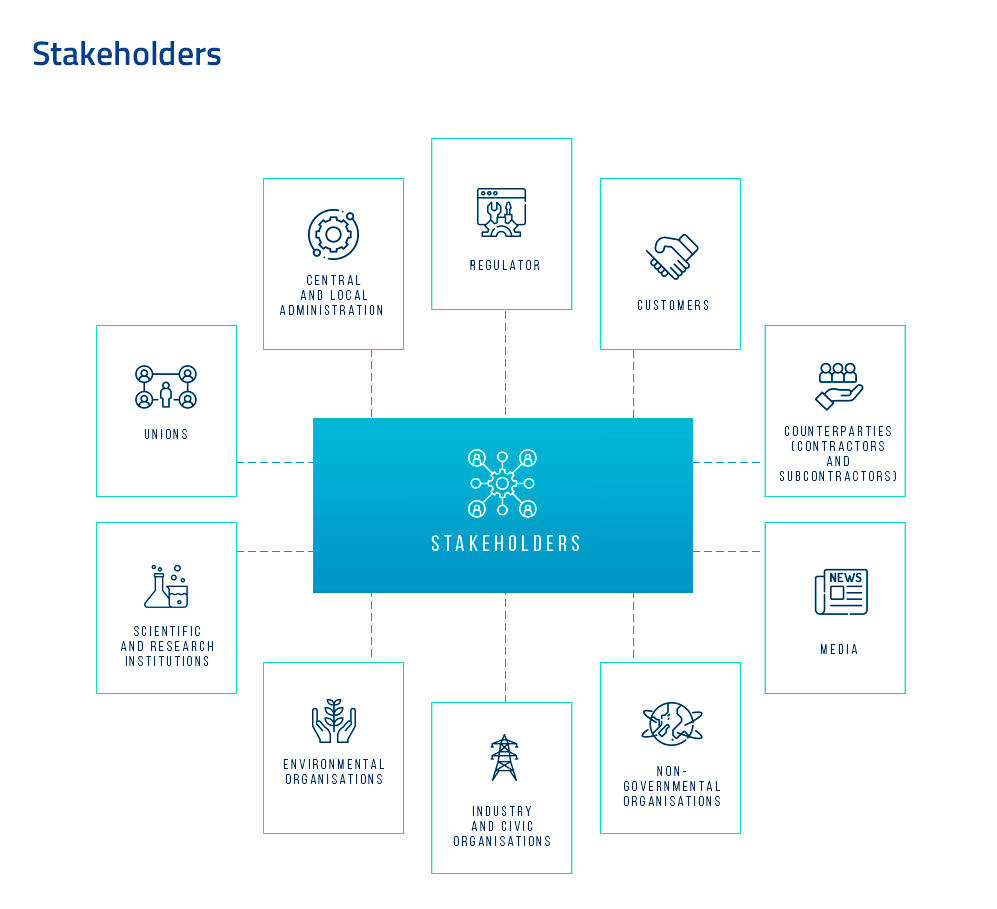
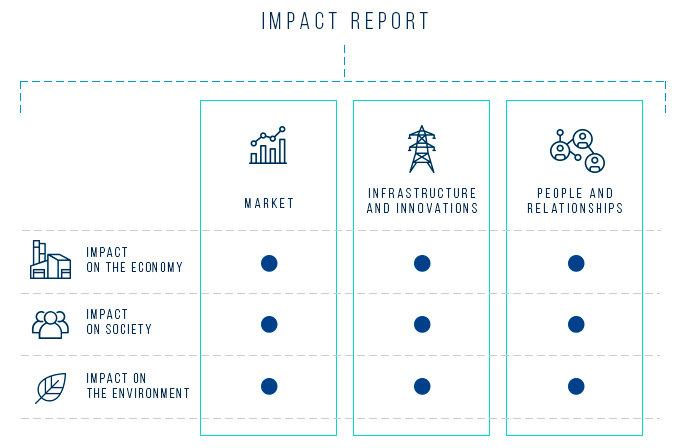
In the course of internal meetings and consultations with PSE’s organisational units, we confirmed the materiality matrix including the key topics to be reported and the report content structure.
Materiality Matrix
- to the market,
- at the workplace,
- to society,
- to the natural environment.
5
4
MATERIALITY FOR THE ORGANISATION
3
Long-term security of electricity supply (preventing the blackout risk) – implementing the capacity market and supporting tools
Transmission system development plan
Requirements and standards of cooperation with contractors and subcontractors (new method of contracting – implementation of the Contractor Qualification System)
Ethics and transparency in relations with business partners (including tendering procedures)
Structure of the power system in Poland and the role of PSE
Strengthening innovation and implementing new technologies
Representing the interests of the national electricity market in the European electricity market
Focus on solutions aimed at adjusting the Polish Power System to the new design of the markets and new technologies (including the energy storage methods, e-mobility, distributed generation – energy from RES)
Availability and transparency of company data material to business partners
Improving the new infrastructure investment implementation model
Upgrading the methods and tools supporting the zonal balancing market
Management of the regulatory risk arising from provisions of the Clean Energy for All Europeans package (substantive support to government administration)
Management of the risk of infrastructure unavailability, including critical infrastructure assets
PSE CG Cybersecurity Programme
Adaptive capacity of the Company: know-how, structures and internal procedures prepared for quick legislative changes taking place in the energy market, and the technical and organisational requirements of new solutions.
Winning social acceptance for line routes (including the acquisition of transmission easement) and social communication around investment projects
Minimising the negative social impact of projects being implemented (noise, interference with landscape)
Promoting energy security knowledge and implemented educational programmes
Responsibility to the natural environment in project implementation, minimising impact on the natural environment in PSE's operations, including preservation of biodiversity in investment project implementation areas.
2
MATERIALITY FOR THE ENVIRONMENT
3,5
5
Long-term security of electricity supply (preventing the blackout risk) – implementing the capacity market and supporting tools
Transmission system development plan
Requirements and standards of cooperation with contractors and subcontractors (new method of contracting – implementation of the Contractor Qualification System)
Ethics and transparency in relations with business partners (including tendering procedures)
Structure of the power system in Poland and the role of PSE
Strengthening innovation and implementing new technologies
Representing the interests of the national electricity market in the European electricity market
Focus on solutions aimed at adjusting the Polish Power System to the new design of the markets and new technologies (including the energy storage methods, e-mobility, distributed generation – energy from RES)
Availability and transparency of company data material to business partners
Improving the new infrastructure investment implementation model
Upgrading the methods and tools supporting the zonal balancing market
Management of the regulatory risk arising from provisions of the Clean Energy for All Europeans package (substantive support to government administration)
Management of the risk of infrastructure unavailability, including critical infrastructure assets
PSE CG Cybersecurity Programme
Adaptive capacity of the Company: know-how, structures and internal procedures prepared for quick legislative changes taking place in the energy market, and the technical and organisational requirements of new solutions.
Winning social acceptance for line routes (including the acquisition of transmission easement) and social communication around investment projects
Minimising the negative social impact of projects being implemented (noise, interference with landscape)
Promoting energy security knowledge and implemented educational programmes
Responsibility to the natural environment in project implementation, minimising impact on the natural environment in PSE's operations, including preservation of biodiversity in investment project implementation areas.
The colors reflect the areas:
Market
Workplace
Society
Natural environmental
GRI 102-44
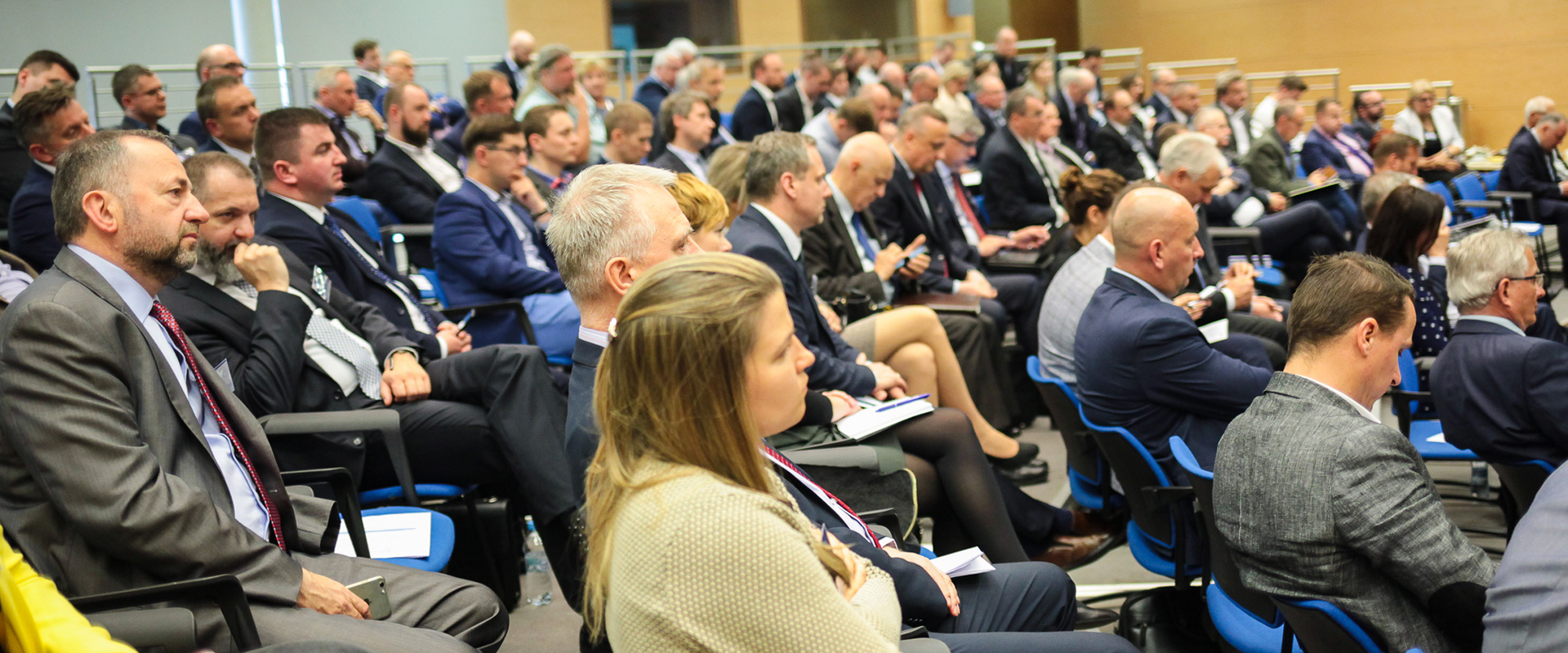
| Responsibility to the market | ||
|---|---|---|
| 1 | Long-term security of electricity supply (preventing the blackout risk) – implementing the capacity market and supporting tools | Link Link Link Link Link |
| 2 | Transmission system development plan | Link Link |
| 3 | Requirements and standards of cooperation with contractors and subcontractors (new method of contracting – implementation of the Contractor Qualification System) | Link |
| 4 | Ethics and transparency in relations with business partners (including tendering procedures) | Link Link |
| 5 | Structure of the power system in Poland and the role of PSE | Link Link |
| 6 | Strengthening innovation and implementing new technologies | Link |
| 7 | Representing the interests of the national electricity market in the European electricity market | Link Link |
| 8 | Focus on solutions aimed at adjusting the Polish Power System to the new design of the markets and new technologies (including the energy storage methods, e-mobility, distributed generation – energy from RES) | Link Link |
| 9 | Availability and transparency of company data material to business partners | |
| 10 | Improving the new infrastructure investment implementation model | Link |
| 11 | Upgrading the methods and tools supporting the zonal balancing market | Link |
| 12 | Management of the regulatory risk arising from provisions of the Clean Energy for All Europeans package (substantive support to government administration) | Link |
| 13 | Management of the risk of infrastructure unavailability, including critical infrastructure assets | Link |
| 14 | PSE CG Cybersecurity Programme | Link |
| Responsibility at the workplace | ||
| 15 | Adaptive capacity of the Company: know-how, structures and internal procedures prepared for quick legislative changes taking place in the energy market, and the technical and organisational requirements of new solutions. | Link Link Link Link |
| Responsibility to society | ||
| 16 | Winning social acceptance for line routes (including the acquisition of transmission easement) and social communication around investment projects | Link Link |
| 17 | Minimising the negative social impact of projects being implemented (noise, interference with landscape) | Link |
| 18 | Promoting energy security knowledge and implemented educational programmes | Link |
| Responsibility to the natural environment | ||
| 19 | Responsibility to the natural environment in project implementation, minimising impact on the natural environment in PSE's operations, including preservation of biodiversity in investment project implementation areas. | Link Link Link |
GRI 103-1 GRI 102-44
| Topics defined as material | Topics covered by GRI standards | Impact of topic within the organisation | Impact of topic outside the organisation |
|---|---|---|---|
| Responsibility to the market | |||
| Long-term security of electricity supply (preventing the blackout risk) – implementing the capacity market and supporting tools* | Indirect economic impact | PSE S.A. | In particular material to customers |
| Transmission system development plan | Strategy | PSE S.A. | In particular material to suppliers, customers, contractors and subcontractors |
| Requirements and standards of relationship with contractors and subcontractors (new method of contracting – implementation of the Contractor Qualification System) | Procurement practices | PSE S.A. | In particular material to contractors and subcontractors |
| Ethics and transparency in relations with business partners (including tendering procedures) | Ethics and integrity Procurement practices |
PSE S.A. | In particular material to contractors, subcontractors and suppliers |
| Structure of the power system in Poland and PSE's role* | Organisation profile Economic performance |
PSE S.A. | In particular material to customers |
| Strengthening innovation and implementing new technologies | Strategy | PSE S.A. | In particular material to customers |
| Representing the interests of the national electricity market in the European electricity market | - | PSE S.A. | In particular material to the owner and participants of the electricity market |
| Focus on solutions aimed at adjusting the Polish Power System to the new design of the markets and new technologies (including the energy storage methods, e-mobility, distributed generation – energy from RES) | Strategy | PSE S.A. | In particular material to the owner and participants of the electricity market as well as RES, environmental and social organisations |
| Availability and transparency of company data material to business partners | Indirect economic impact | PSE S.A. | In particular material to customers |
| Improving the new infrastructure investment implementation model* | Strategy | PSE S.A. | In particular material to contractors, subcontractors and suppliers |
| Upgrading the methods and tools supporting the zonal balancing market | - | PSE S.A. | In particular material to electricity market participants |
| Management of the regulatory risk arising from provisions of the Clean Energy for All Europeans package (substantive support to government administration) | - | PSE S.A. | In particular material to the owner and participants of the electricity market |
| Management of the risk of infrastructure unavailability, including critical infrastructure assets* | - | PSE S.A. | In particular material to customers |
| PSE CG Cybersecurity Programme | - | PSE S.A. | In particular material to the owner and participants of the electricity market |
| Responsibility at the workplace | |||
| Adaptive capacity of the Company: know-how, structures and internal procedures prepared for quick legislative changes taking place in the energy market, and the technical and organisational requirements of new solutions. | Employment Regulatory compliance |
PSE S.A. | In particular material to potential employees and the regulator |
| Responsibility to society | |||
| Winning social acceptance for line routes (including the acquisition of transmission easement) and social communication around investment projects | Local community | PSE S.A. | In particular material to local communities |
| Minimising the negative social impact of projects being implemented (noise, interference with landscape) | Local community | PSE S.A. | In particular material to local communities |
| Promoting energy security knowledge and implemented educational programmes | Indirect economic impact | PSE S.A. | In particular material to local communities |
| Responsibility to the natural environment | |||
| Responsibility to the natural environment in project implementation, minimising impact on the natural environment in PSE's operations, including preservation of biodiversity in investment project implementation areas. | Compliance with environmental regulations Environmental assessment of suppliers |
PSE S.A. | In particular material to local communities |
GRI 102-11

GRI 102-53
Małgorzata Jachimowska-Noworyta
Sustainable Development Officer
at PSE CG
malgorzata.jachimowska-noworyta@pse.pl
Ada Konczalska
Director, Communication Department
ada.konczalska@pse.pl
| Marta Babicz Andrzej Bartosik Arkadiusz Basista Dariusz Blachliński Marta Borzyńska Dominik Borowiec Monika Charuba Edyta Czarnecka Katarzyna Fryga-Szewczenko Eliza Gawlicka Konrad Godzisz Marta Jachacy Karol Jakubowski Beata Jarosz-Dziekanowska Joanna Kijek-Baryś Jolanta Kmiecik |
Dariusz Kołakowski Magdalena Kozik Jakub Kudliński Jacek Kuchenbeker Magdalena Kwiatecka Małgorzata Łachniak Beata Łapczyńska Martyna Małyszko Mariusz Majewski Daniel Owczarek Maciej Wapiński Wioleta Wińkowska Tomasz Nowakowski Łukasz Pawlak Alicja Poznańska Hubert Redkowiak |
Magdalena Ryś-Przeszlakiewicz Paweł Sadowski Liliana Sidorczuk Katarzyna Skrzymowska Dagmara Sławińska – Nosek Witold Smolik Kamil Smolira Ewa Soroka Michał Stachyra Marcin Stokowski Elżbieta Szymańska Katarzyna Turek Sylwia Włodarczyk Paweł Wójcik Anna Wronka |
